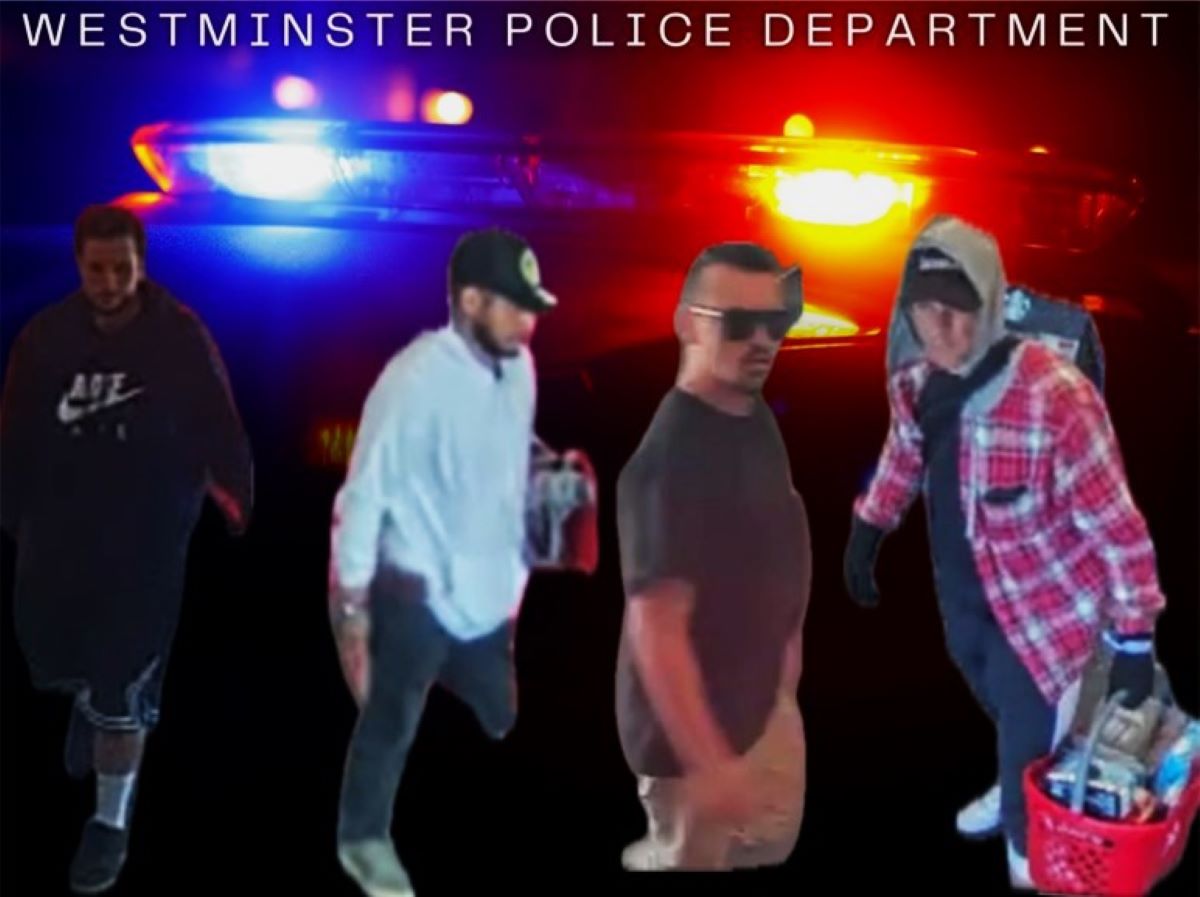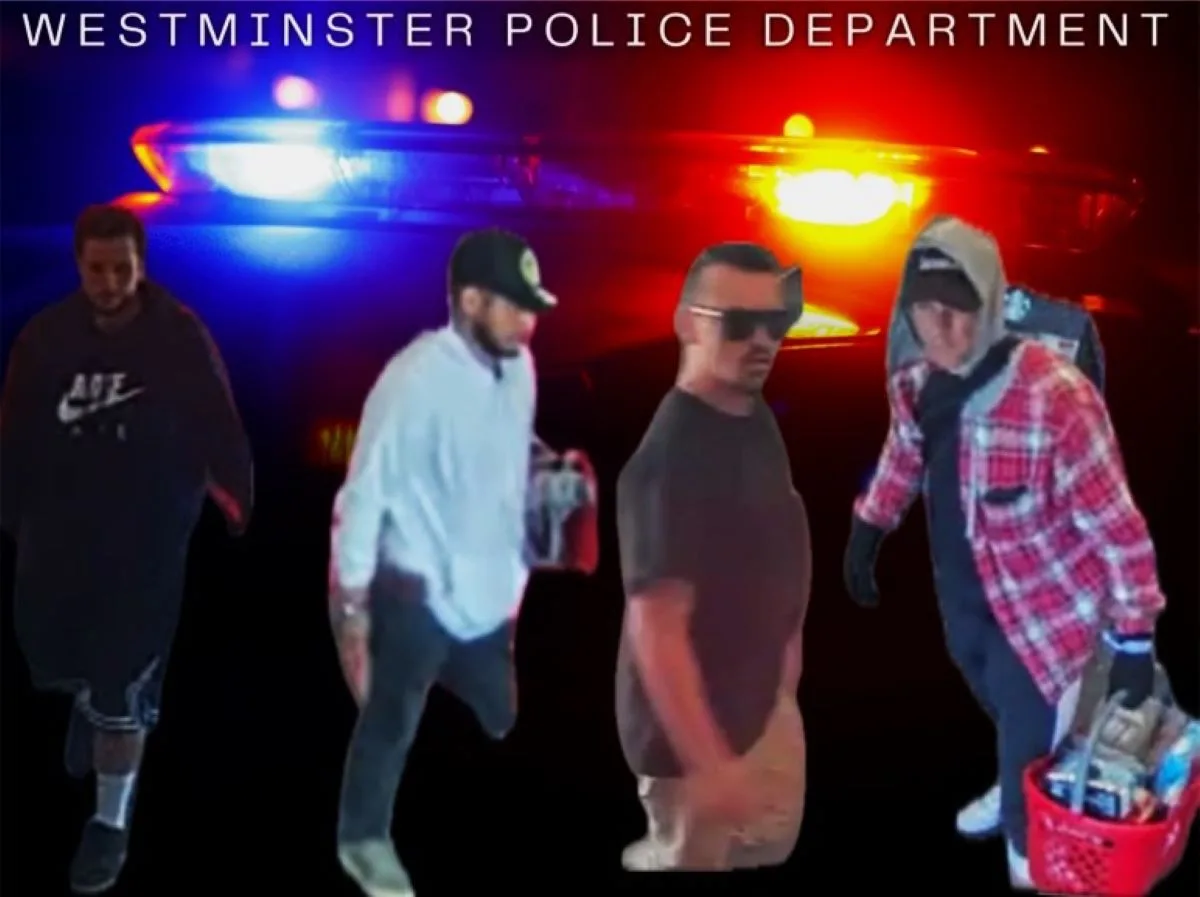
This post was originally published on this site
Recently, there has been an uptick in thefts from target committed by several individuals, according to the Westminster Police Department.

The Westminster Police released a picture of the suspects. They appear to be four male suspects. In the picture a couple of them appear to be holding retail goods indicating that they are likely a ring of retail thieves.
The suspects appear to be White or Hispanic. They were dressed casually in the released picture in shorts, jeans and t-shirts. The police also released a photo of a bike with a wheeled cart indicating that perhaps that was used as a getaway vehicle by the theft suspects.
If you recognize these individuals please reach out to Investigator Antonelli at JAntonelli@westminster-ca.gov.
In Westminster, California, which is in Orange County, penalties for retail theft are governed by California state law. Recent changes in California law, particularly those effective January 1, 2025, have significantly increased penalties for repeat retail theft offenders and organized retail crime.
Here’s a breakdown of the penalties and factors that influence them:
I. General Shoplifting and Theft Laws in California:
- Petty Theft (Misdemeanor): If the value of the stolen goods is $950 or less, it’s generally considered petty theft, a misdemeanor. Penalties can include up to 6 months in county jail and/or a fine of up to $1,000.
- Grand Theft (Felony/Wobbler): If the value of stolen goods exceeds $950, it can be charged as grand theft, which is a “wobbler” offense. This means it can be prosecuted as either a misdemeanor or a felony, depending on the circumstances of the case and the defendant’s criminal history. Felony grand theft can carry penalties of 16 months, 2 years, or 3 years in prison (served in county jail) and/or fines up to $10,000.
- Shoplifting (PC 459.5): This specific charge applies when someone enters an open commercial establishment with the intent to steal merchandise valued at $950 or less during regular business hours. It’s typically a misdemeanor with penalties similar to petty theft (up to 6 months in jail, $1,000 fine). However, prior convictions can elevate this to a felony.
II. Enhanced Penalties for Repeat Retail Thefts (Effective January 1, 2025):
California is cracking down on repeat offenders. Here are key changes:
- Automatic Felony for Repeat Offenders: If you have previous theft convictions, your next theft offense, even if the value is under $950, may now automatically be charged as a felony.
- Extended Probation: Judges can impose probation terms of up to two years for repeat offenders, often including mandatory rehabilitation programs.
- Aggregation of Theft Amounts: Prosecutors can now combine the value of stolen goods from multiple incidents or victims to reach the $950 felony grand theft threshold. This means that multiple small thefts, which might individually be misdemeanors, can now be aggregated and charged as a single felony if their combined value exceeds $950 within a 90-day period.
- Organized Retail Theft (PC 490.4): This is now a permanent felony offense. If two or more people act together to steal merchandise with the intent to sell, exchange, or return it, they face harsher penalties, even if they stole items individually. This also applies to those involved in the large-scale resale of stolen goods.
- Felony organized retail theft carries a potential sentence of 16 months, 2 years, or 3 years in prison.
- Sentencing Enhancements:
- If the total value of stolen goods in an organized retail theft exceeds $50,000, an additional 1-year prison term applies.
- If it exceeds $100,000, the enhancement increases to 2 extra years.
- If it exceeds $1,000,000, it’s an additional 3 years.
- If it exceeds $3,000,000, it’s an additional 4 years.
- Retail Crime Protective Orders: Courts can now ban convicted individuals from entering specific retail stores for up to two years to prevent repeat offenses. Violation of such an order can lead to additional criminal charges.
- Felony Possession of Stolen Goods (AB 2943/PC 496.6): Possessing stolen property with the intent to resell it is now a new felony offense with harsher consequences, potentially leading to up to three years in jail, even if you did not personally steal the goods.
III. Important Considerations:
- Westminster Specifics: While the laws are state-wide, cases are handled in the West Justice Center in Westminster. Local judges and prosecutors will apply these state laws.
- Civil Demands: In addition to criminal penalties, businesses can make a civil demand (under PC 490.5) for damages up to $500, plus the retail value of the merchandise if it’s not returned in a merchantable condition. This is separate from criminal prosecution.
- Defenses: An experienced criminal defense attorney can explore various defenses, such as challenging the valuation of stolen goods, mistaken identity, lack of intent to steal, or unlawful search and seizure. Diversion programs or civil compromises might also be options in some cases, especially for first-time offenders.


